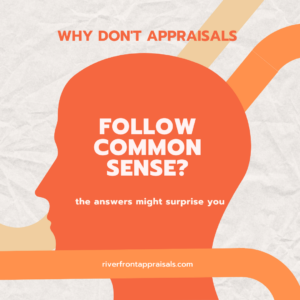
FAQ #19: What Are Some Of The Craziest Things You’ve Heard As An Appraiser?
I feel like we all need a laugh. How about

Appraisal waivers have been around for quite some time now, but have really gained serious traction just in the past few years. I realize that some may not be familiar with the term, or its dangers, so in this short post, I’ll cover both.
An appraisal waiver is simply an agreement between a lender and a borrower in which the borrower agrees to waive their right to an appraisal. Most of the time, waivers are signed because the lender has other ways of estimating the property’s value (computer models, etc), or the loan-to-value ratio (LTV) is so extremely low, that it’s a no-brainer for the lender. An example would be if you were buying a $450,000 house and putting a $375,000 down payment.
Appraisal waivers really amped up in the past couple of years during the crazy refi-boom with rates at 3%. Loan officers were making money hand over fist, and appraisers couldn’t get reports in fast enough. So, in an effort to expedite the loan process (and do a huge disservice to borrowers in the process), lenders started offering appraisal waivers. This saved the borrower money up front, and shortened the entire loan process.
Yes it often cut down the time required to get a loan, and yes, it saved the borrower a few hundred dollars on their loan. But at what expense? Explaining the risks of appraisal waivers is where we’ll spend the rest of our time, because this is something that I would say most lenders and Realtors have not done a great job of.
Of course, I’m an appraiser, so I have to be careful here. I say that, because I know the first thing y’all will think is that “Oh sure, you’re an appraiser. Of course you’re against appraisal waivers!” But it’s no different than a mortgage broker saying don’t use a traditional lender, or a Realtor cautioning against selling your home by owner. Call me biased in this case. I’m ok with that. If I’m not passionate about my business, and if I don’t think getting an appraisal is the best idea, then I have no business being an appraiser. Just like a Realtor has no business selling homes, if they think selling by owner is a viable option. So that being said, here’s a few reasons why you should seriously consider avoiding appraisal waivers:
I’m an appraiser, and I hate to lose out on business, but there are some advantages to getting a waiver in certain circumstances. As I mentioned in the above example, if your loan-to-value ratio is super low, and it’s a 100% slam dunk that the home is worth a ton more than you’re borrowing, then in that case, it might be ok. And yes – when appraisers were 2-4 weeks out from even getting to a home for the appraisal, waivers did help move the process along. But that’s about all the positives I can say. In any regard, if you do qualify for a waiver, my recommendation is to go ahead and hire an appraiser privately. It will actually end up being cheaper in the long run for most borrowers. Many lending institutions will charge you the appraisal fee, and then other fees ‘associated’ with the appraisal. Some companies end up doubling the appraisal fee. So if you do qualify for a waiver, that doesn’t mean that you should proceed without an appraisal. Hire an appraiser, pay less than you would have anyway with the bank, and then move forward if you’re able.
And finally, a word of caution. For our lenders and Realtors listening, if you’re employing appraisal waivers and aren’t explaining the dangers of not having the home appraised, then you are doing a disservice to your client. If you’re a Realtor working in any capacity in which you owe a fiduciary duty to your client, and you’re advising them to go through with an appraisal waiver without getting the home independently and privately appraised, then I would also argue that you are breaking your fiduciary duty, and may be opening yourself up to potential lawsuits down the road. I can hear it now: I just got my appraisal back, and my home isn’t worth what I paid for it last year. Was it even worth $320,000 then? You told me I didn’t need an appraisal. If you had advised me to get it appraised, I might not have purchased it, if the home wasn’t worth what I was paying! So at a minimum, I suggest first talking with your broker and getting their advice, but if your client does go through with the waiver and doesn’t get a private appraisal, get a form signed that says you advised your client of their right to have the home privately appraised, and they have waived that right.
Appraisal waivers have helped reduce the time it takes to get a loan, and have – in some rare cases – been an acceptable alternative to the traditional appraisal. However, in this drastically different market, when values are all over the place and appraisers are able to get appraisals turned faster, there really is no need to waive this incredibly important step to the loan process.
If you have a question you’d like us to feature, email me at ryanbays@riverfrontappraisals.com

I feel like we all need a laugh. How about

So this may be a slight break from the norm,

Selling your home can be a major financial decision, and
Riverfront Appraisals has been providing comprehensive valuations of residential properties to Western Kentucky and Southwestern Indiana since 2008.